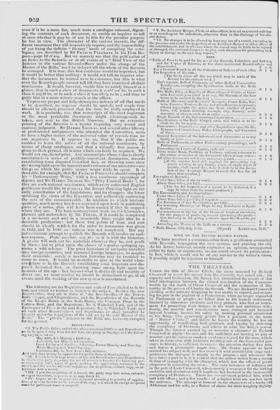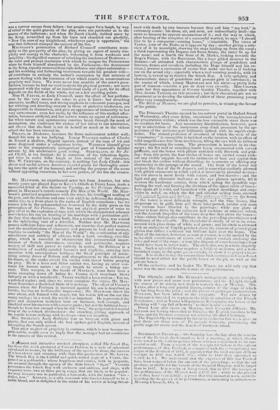TIIE TII EAT p.Es. uNDEtt the title of Master Clarke,
the name assumed by Richard Cromwell to cover his retreat into the obscurity that suited alike his capacity and inclination, Mr. SE111.1.: 11:IS dramatized the events of that brief iuterregnum between the virtual termination of the Common- wealth by the death of Oliver Cromwell and the restoration of ;Mo- narchy in the person of Charles the Second. We see Richard Cromwell yielding to the military despotism he was unable to control, and resign- ing his part in the pageant of a Protectorate when no longer supported by Parliament or people: we follow him to his limnely retirement, haunted by clamorous creditors awl busy plotters, who find an instru- ment for promoting their designs in his weak and ambitions wife: finally, the amiable and conscientious man, outraged and harassed beyond bearing, insures his safety by making personal submission to the King, who generously grants hint a passport in the name of " Master ('lark';" and before he leaves the country he has an opportunity of' manifesting both gratitude and loyalty by defeating the conspiracy of Deshrowe and others to seize the King's person. Though the interest excited by so negative a character as Richard Cromwell is slight—his acts and his sufferings not moving to pity or wonder—yet his virtuous conduct awakens a regard for the man, which, taken in connexion with incidents recalling one of the least-noted pas- sages in history, is sufficient to engage the attention during five acts, and leaves a pleasurahle impre..sion. Mr. Semm: appears to have studied his subject well, aml has treated it with considerable stage tact: moreover, the dialogue is mostly to the purpose ; and whenever the IWO, takes a part in it, it is evident that the author writes from a strong feeliog or spripai fly with the character, which has the effect of poetic eloquence in oni mating the scene. The only instances of inflation are in the part or Lady Cromwell, who is merely a scapegoat for the lurking ambition and di,conteut which implicate her husband in the treasonable conspiracy of' Desbrowe. There a re :Pveral smart political hits, which told with effect ; and a few Winches of a higher kind are not lost upon the audience. The attempt at humour in the characters of a booby old Alderman and his wife, in a flutter of alarm for their knightly dignity.
was a narrow escape from failure : but people eager for a laugh, by way. of relief to the quiet gravity of the play, were not particular as to the source of the ludicrous; and when Sir Jacob Chubb, dubbed anew by the King, scrambled up from his knee and chuckled out gleefully, " Now I'm sure of my knighthood, whichever party is uppermost," the roar that followed stamped the success of the fun.
MACREADY'S personation of Richard Cromwell contributes mate. richly to the prosperity of the play, by giving an aspect of manly sim- elicity and energy to the character, redeeming it from weakness and insipidity : his dignified manner of rebuking the insolence of Desbrowe- the calm and prompt resolution with which he resigns the Protectorate when he finds himself abandoned by the Parliament—his demeanour to the King, equally removed from rude defiance and abject submission— and his soothing and forbearing tenderness towards his petulant wife— all contribute to embody the author's conception by that mixture of earliest feeling with the resources of art which results in unostentatious. propriety and force. We were never less sensible of the actor's pecu- liarities, because he had no need to strain his physical powers ; nor more impressed with the value of an intellectual study of a part, for its effect depends on the finish of the whole, not on a few startling points. Miss H. Einar, as Lady Cromwell, mars the effect of her perform- ance by the very means she takes to give it force : her mouthing utterance, muffled tones, and strong emphasis in vehement passages, and i b
her whining and drawling accents n those of plaintive tenderness, are disagreeable in themselves, and give an appearance of insincerity to her very earnestness : even her smile, by the influence of this studied affec- tation, becomes artificial, and her sorrow wears an aspect of sullenness : but when nature and spontaneous emotion break through the mask of assumption, she vindicates the claims of her talent to our admiration, and shows that the fault is not in herself so much as in the vicious school she has been tutored in. •
PHELPS, as Desbrowe, becomes the fierce malecontent soldier well; though his tone is too bullying. Young Weiss-rem makes of Charles Me Second a shallow, flippant upstart, instead of the man of wit and sense disguised under a voluptuous levity. WEBSTER himself gives value to the comparatively unimportant part of Cromwell's faithful servant, by his unobtrusive good acting. STRICKLAND, as Sir Ja- cob Chubb, is too farcical: he is conscious of his ridiculous figure, and tries to make folks laugh at hint instead of the character, Mrs. W. CLIFFORD, on the contrary, is nothing but Lady Chubb : this clever and useful actress deserves especial praise for thoroughly enter- ing into the spirit of the humour, and serving the purpose of the scene without appearing conscious, in her own person, of the fun she creates.



























 Previous page
Previous page